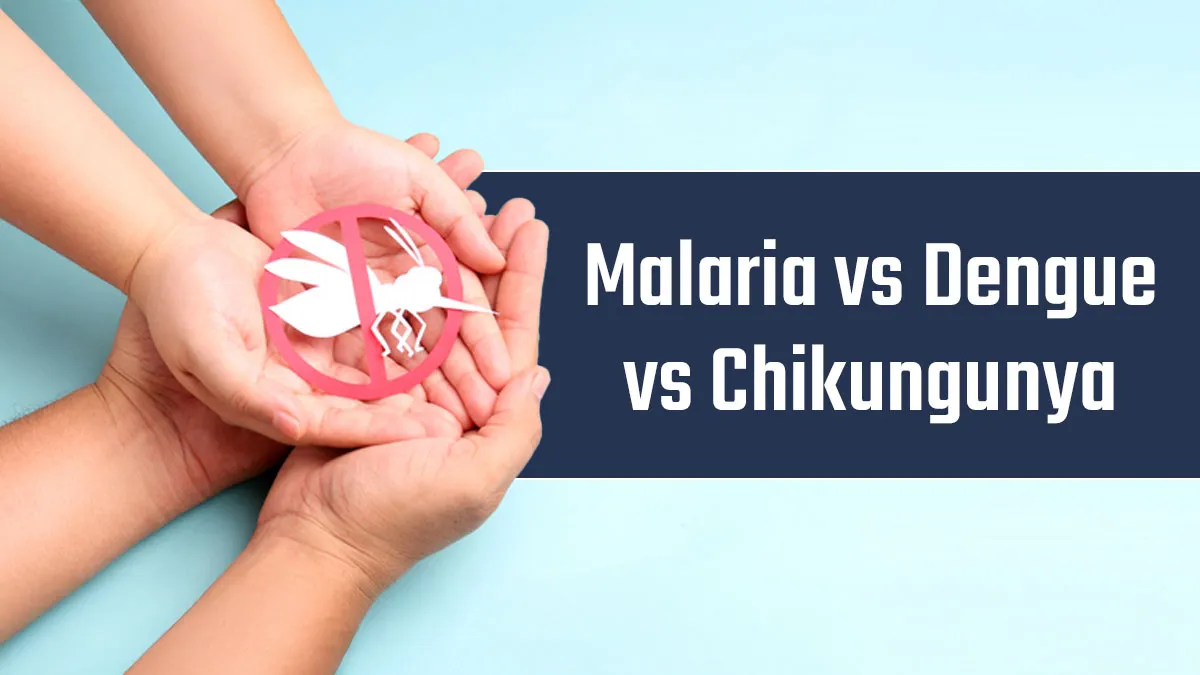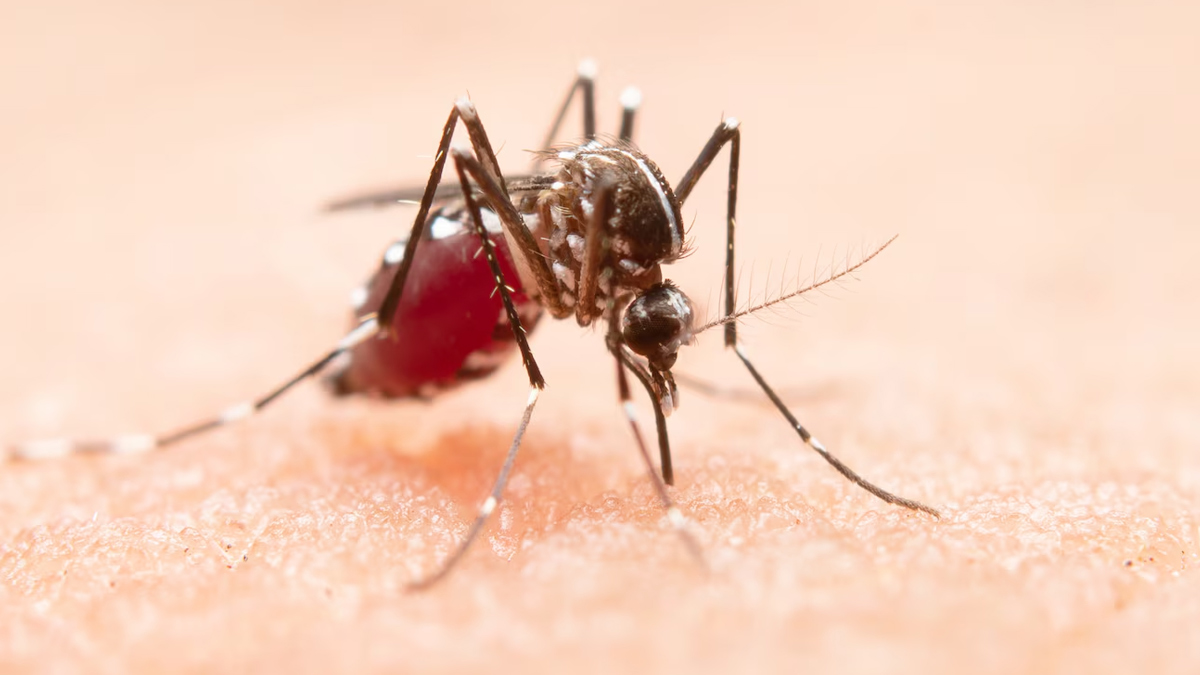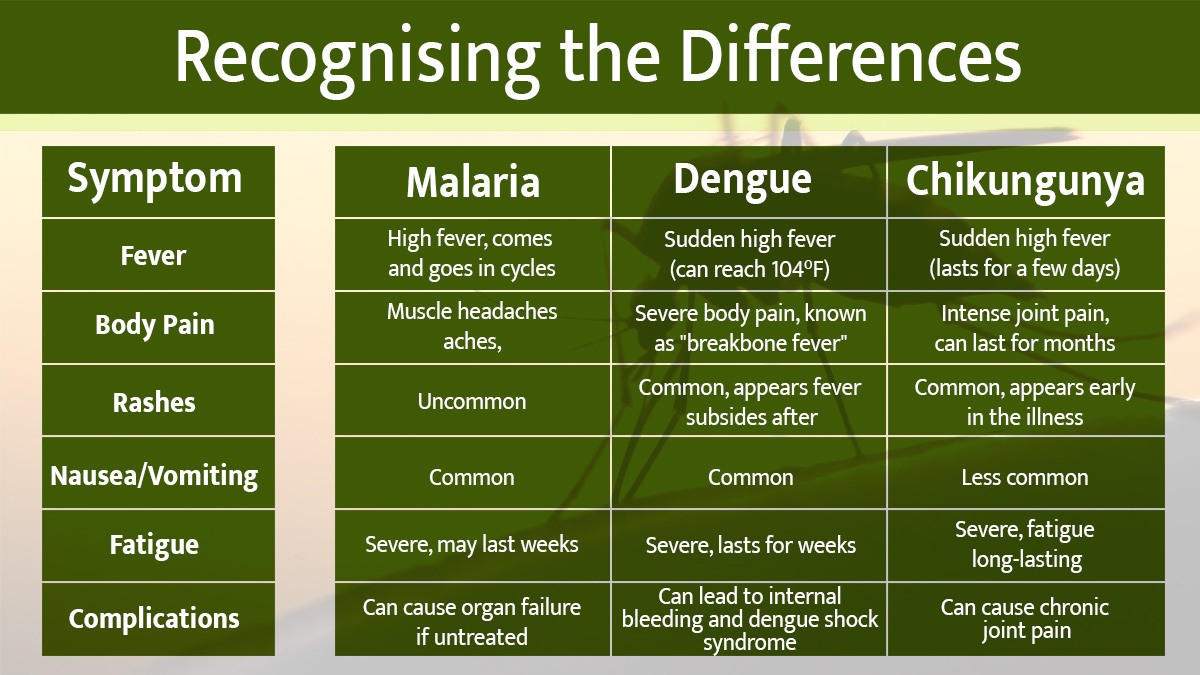
Feeling sick with fever, aches, and exhaustion? It's easy to mistake it for the common flu, but especially when mosquitoes are active, it could be something more serious like malaria, dengue, or chikungunya. These illnesses often look alike, making it hard to know what you're dealing with early on.
Table of Content:-
Mosquito bites cause all three, although the reasons, symptoms, and therapies vary. We spoke to Dr Bhavani Prasad Gudavalli, Head of the Department of Critical Care, CARE Hospitals, Banjara Hills, Hyderabad, who helped differentiate between them and keep these diseases at bay.
What Causes These Illnesses?

- Malaria is spread via the bite of a female Anopheles mosquito carrying the parasite Plasmodium.
- Dengue Virus (DENV), which causes Dengue, is primarily spread during the day by Aedes mosquitos.
- The Aedes mosquitos also carry the Chikungunya virus (CHIKV), which causes Chikungunya.
According to the Journal of Vector Borne Disease, chikungunya, and dengue share not only endemic regions but also exhibit some similar clinical symptoms. As a result, there is a risk of misdiagnosing a dual infection as a single infection. The presence of multiple infectious agents can complicate both diagnosis and subsequent treatment.
Also Read: Malaria’s Next Wave: Why Drug Resistance Is Making Malaria Tougher To Fight?
Recognising the Differences

Symptoms
Fever
- Malaria: High fever, comes and goes in cycles
- Dengue: Sudden high fever (can reach 104°F)
- Chikungunya: Sudden high fever (lasts for a few days)
Body Pain
- Malaria: Muscle aches, headaches
- Dengue: Severe body pain, known as 'breakbone fever'
- Chikungunya: Intense joint pain that can last for months
Rashes
- Malaria: Uncommon
- Dengue: Common, appears after fever subsides
- Chikungunya: Common, appears early in the illness
Nausea/Vomiting
- Malaria: Common
- Dengue: Common
- Chikungungya: Less common
Fatigue
- Malaria: Severe, may last weeks
- Dengue: Severe, lasts for weeks
- Chikungunya: Severe, long-lasting fatigue
Complications
- Malaria: Can cause organ failure if untreated
- Dengue: Can lead to internal bleeding and dengue shock syndrome
- Chikungunya: Can cause chronic joint pain
Which One Is More Dangerous?

"If these three diseases are not handled effectively, they might lead to major problems. Dengue is notably the most fatal, as it can lead to life-threatening conditions, such as internal bleeding and organ failure," said Dr Gudavalli.
Untreated malaria can cause cerebral malaria, kidney failure, and even death. Although chikungunya seldom causes death, it can cause long-term joint pain that keeps patients from living their normal lives for months.
How Are They Diagnosed?

- Malaria: Blood test for Plasmodium parasites.
- Dengue: Blood tests for dengue virus or Dengue NS1 antigen test.
- Chikungunya: Blood tests can detect Chikungunya virus IgM antibodies.
Early diagnosis is critical for avoiding major problems, so do not wait for symptoms to worsen before seeking medical attention.
What is the Medicinal Intervention?
Malaria is treated with antimalarial medications, such as artemisinin or chloroquine.
- Dengue does not have a specific treatment. The primary goals of treatment are to control symptoms, use pain relievers, and drink plenty of water (avoid aspirin, which increases the risk of bleeding).
- For chikungunya, pain relievers, water, and rest are prescribed to alleviate symptoms. Certain steroids and disease-modifying anti-rheumatic drugs are also used.
- Since there is no direct antiviral treatment for dengue and chikungunya, prevention is the best course of action.
How To Prevent These Mosquito-Borne Diseases?
The most effective defence against mosquito bites is to prevent them in the first place. Here’s how:

- Wear long sleeves. Apply an insect repellent. This is especially crucial during the day to avoid dengue and Chikungunya.
- To keep mosquitos at bay, especially in malaria-prone locations, keep your surroundings clean and sleep with mosquito netting.
- Mosquitoes can also be avoided by placing screens on windows and doors.
- Additionally, governments use fogging and awareness programs to minimise mosquito populations.
Bottomline
Dr Gudavalli concluded, "Mosquitoes transmit dengue fever, chikungunya, and malaria, but each disease has its own physiological consequences. Early recognition of their symptoms and timely medical intervention can save lives. Because monsoons and changing climate patterns increase the possibility of these diseases spreading, it is more important than ever to stay aware and take preventive measures."
So, the next time you have a fever, don't assume you have the seasonal flu. It could be something more dangerous, so you must act quickly!
[Disclaimer: This article contains information provided by an expert and is for informational purposes only. Hence, we advise you to consult your professional if you are dealing with any health issues to avoid complications.]
Also watch this video
How we keep this article up to date:
We work with experts and keep a close eye on the latest in health and wellness. Whenever there is a new research or helpful information, we update our articles with accurate and useful advice.
Current Version